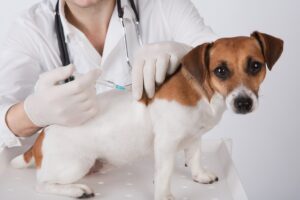
In honor of World Rabies Day, schedule a pet vaccination appointment if you haven’t done so yet!
Rabies is one of the most devastating viral infections, mainly impacting dogs and humans. It’s found worldwide, including North America, Central and South America, Africa, and some parts of Europe. In honor of World Rabies Day on September 28, Mount Carmel Animal Hospital wants to share more information on what to do if your pet is potentially exposed to rabies.
Transmission
Rabies is transmitted through direct contact with saliva or brain/nervous system tissue of an infected animal. The most common way this virus is transmitted is through an infected animal biting another. Skunks, foxes, raccoons, coyotes, and bats are the leading sources of infection in North America, while stray dogs are the main reservoirs in Asia, Africa, and Latin America. Human infection and fatalities are more prevalent in those areas. After the bite occurs, the rabies virus enters any nerves exterior of the brain and spinal cord of the host animal. Afterward, it reproduces and spreads to the animal’s salivary glands.
Signs & Symptoms
Following a bite from a rabid animal, rabies progresses in stages. In the first phase, the dog experiences a marked change in temperament. Quiet dogs become agitated, and active pets become shy or nervous. This stage may last 2-3 days. After this prodromal phase, there are two forms of the clinical disease:
- Furious rabies is the form most people think of when they think of rabies. This refers to when the rabid dog becomes highly excitable and aggressive. Paralysis eventually sets in, and the infected animal might be unable to eat and drink.
- Dumb rabies is prevalent mainly in dogs. Pet owners will frequently think the dog has something stuck in the throat or mouth. This is because the jaw and throat muscles become paralyzed causing excessive drooling and inability to swallow. It’s vital that care must be taken in examination since rabies can be transmissible via saliva.
Prevention & Vaccination
Vaccination is the foundation of rabies prevention. It promotes the production of antibodies but only works if given before the virus enters your pet’s nervous system. Modern rabies vaccines for cats, dogs, and ferrets are safe and effective. Fortunately, plenty of rabies vaccines are approved for dogs, cats, ferrets, and horses. All dogs and cats between ages 12 to 16 weeks must be vaccinated. In honor of World Rabies Day, schedule a pet vaccination appointment if you haven’t done so yet!
What to Do if Your Pet is Potentially Exposed
If your pet got into a scrap with an animal with unknown vaccine status or an animal you suspect may have had rabies, it is imperative to act immediately regardless of your pet’s vaccine status. We will vaccinate your pet for rabies even if they are up to date to ensure full protection. Your pet will also need to be placed on a strict 10-day quarantine to monitor for any signs of rabies. Rabies can only be diagnosed by directly examining the animal’s brain. As a result, it’s not possible to diagnose this disease in a living animal. If you highly suspect your pet has rabies or if he or she shows symptoms of rabies and dies suddenly, we will have to send out brain samples for testing. This may be required if there has also been human exposure.
Maryland and Pennsylvania Laws
The frequency of revaccination for rabies disease varies on state or provincial law. Your veterinarian will advise you on the best revaccination intervals and may assist you in obtaining any necessary licenses for your pet. In Maryland and Pennsylvania, the rabies vaccine is required for puppies and kittens, then one year later and every three years after that.
World Rabies Day is an opportunity to consider how rabies affects your community and other communities worldwide. Since dogs and cats have a high vaccination level in the United States, rabies in pets is relatively rare.
HERE AT MOUNT CARMEL ANIMAL HOSPITAL, WE’LL TREAT YOUR PETS LIKE FAMILY!
Mount Carmel Animal Hospital has been serving the Northern Baltimore/Southern York community for over 30 years and is proud to be an independently operated, small animal practice committed to excellence in veterinary medicine and client service. From grooming to wellness services, along with Canine Life Skills Training Courses, and surgical procedures, we have the expertise that will best serve the needs of you and your pet. Contact us at 410-343-0200 and follow us on Facebook!
